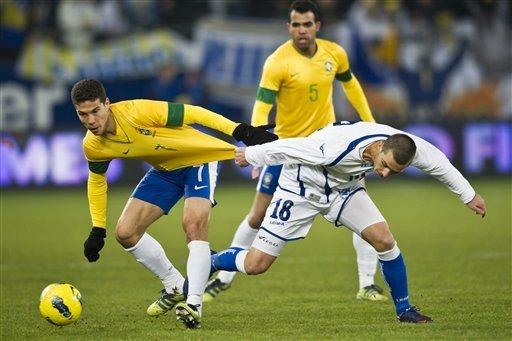Yeah, yeah, I hear you protest. We know about Neymar by now. But this was not Neymar. This was a 34-year-old veteran. This was Deco.

On the face of it, a number of players could have hogged the headlines in the wake of the first leg of the Campeonato Carioca final on Sunday. Former Betis striker Rafael Sóbis grabbed a classy brace as Fluminense thrashed Botafogo, whilst the goal of the game was undoubtedly Fred’s nonchalant bicycle kick in the first half.
Yet both were overshadowed by the unparalleled vision and metronomic passing of Flu's number 20, who turned in a performance that – in this month of relative turmoil in Catalunya – evoked the pomp of his Barcelona days. Playing in an advanced central midfield role, Deco repeatedly set the Tricolor in motion with a range of subtle flicks; eschewing showiness in favour of the elegant utilitarianism for which he was revered in Europe.
Deco's assist for Flu's second, a measured pass of no more than ten metres in length, was particularly noteworthy. A barely-perceptible hesitation between his first touch and the final ball tempted Fábio Ferreira into committing to a challenge, allowing Sóbis the space to curl a shot into the far corner.
It was an act of muted genius in keeping with the man himself. Affable and quiet off the pitch, Deco stands in opposition to the modern footballing archetype. His decision to return to Brazil was motivated in part by a desire to step up the charitable work he undertook whilst playing in Europe. Through the Deco20 Institute, he helps provides educational support for around 300 youngsters in São Paulo, and his celebrity football matches also raise money for good causes.
Whilst such activities have bolstered Deco's reputation, they haven't always protected him from the ire of Brazilian football fans. Until this year, his relationship with the Flu faithful was a fractious one. With the former Chelsea midfielder troubled by incessant injury problems during his first year at Laranjeiras, supporters began to question his value to the squad, particularly given his substantial wage packet.
Deco initially reacted to these criticisms with anger: "I came home and my son had read on the internet that I was "robbing" Fluminense," he said back in August. "I don’t care when people talk about [my] football, but this is annoying." Around this time, it later emerged, Deco considered hanging up his boots for good.
However, a change of strategy signalled the beginning of a more cordial entente between the player and supporters. As a gesture of goodwill, Deco suggested that Flu should not pay him until he returned to full fitness. "He didn’t come to Fluminense for the money," gushed Sandro Lima, the club’s vice president. "He just wants to work hard and end his career with happiness."
The intervening months seem to have provided Deco with exactly the sort of Indian summer he had in mind when he decided to return to Brazil. A series of impressive performances in big matches, including a gala display the Copa Libertadores win over Boca Juniors at the Bombonera, have cemented his place in Abel Braga’s plans.
In an interview last month, Deco indicated that he intends to continue playing until the end of the 2013 season: "I really identify with the club. I like being here," he told Globo. If he continues to turn in the kind of performance that he did on Sunday, Fluminense will be lucky to have him around.
A version of this article appeared on the Guardian Sport Network HERE.






